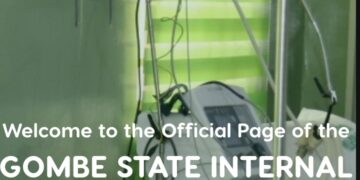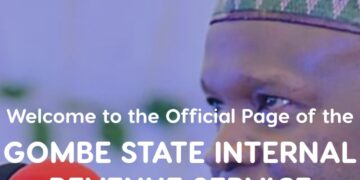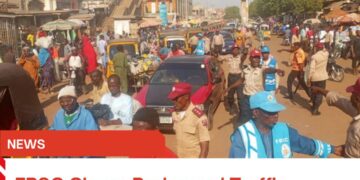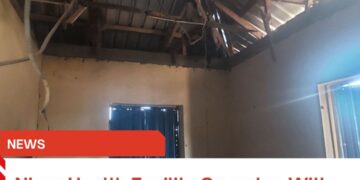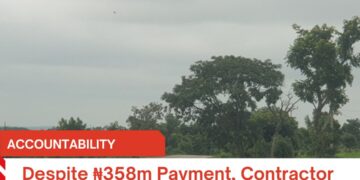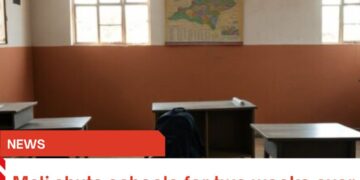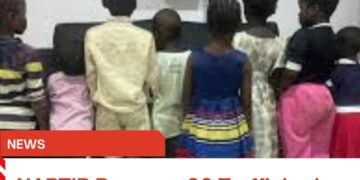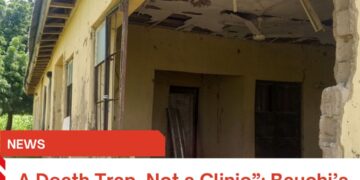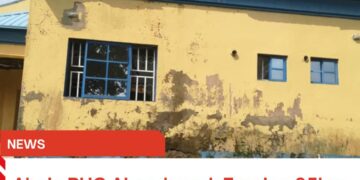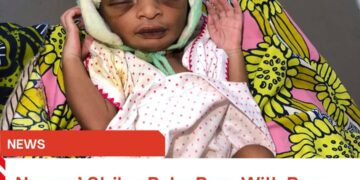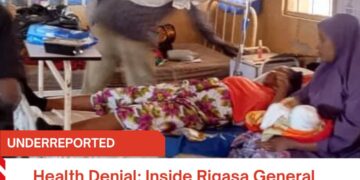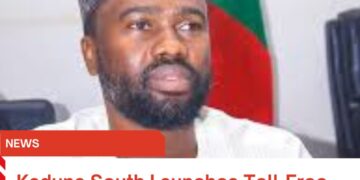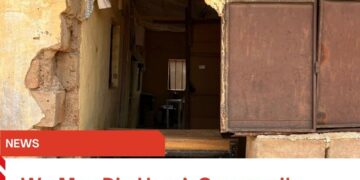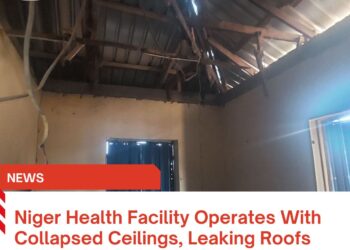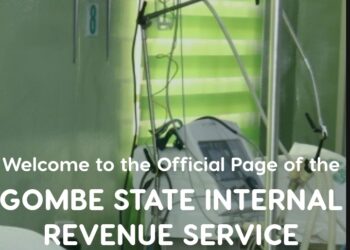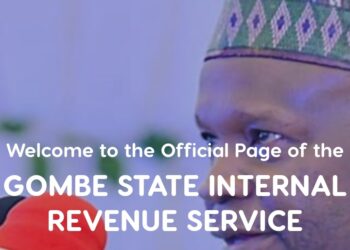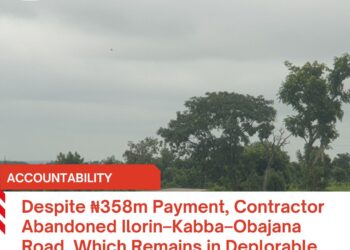When Shongo Sarkin Yaki Primary School, Kwami Local Education Authority (LEA) was renovated as part of the ongoing transformation of the education sector recently, the community members were hopeful. This renovation symbolized an opportunity for equitable access to education in a safer and more conducive environment. Among those hopeful was Bello Abubakar Sadiq, a pupil at the school.
However, just months after the renovation, the school suffered significant damage when heavy rains and winds blew off a portion of the roof for a block section consisting Primary 1, 2 and office in the rainy season.
“Whenever rain starts falling, we do not feel comfortable to learn anymore,” Abubakar explained, voicing the frustration of many who feel their education is hindered by climate-related challenges and delays in governmental responses.
According to Bakari M. Hassan, the Headmaster of Shongo Sarkin Yaki Primary School, climate change has severely affected three classroom blocks in the primary section of the school.

“We can’t use one of the damaged blocks housing two classrooms and an office because it’s uninhabitable. We are still managing other blocks with leaking roofs. Whenever it rains, we can’t access these classrooms until we manually drain the water to make space for the pupils,” he said.
“Due to the damaged classrooms, we had to merge two classes into one, divided by ceiling. Since it’s a morning session, we don’t have any alternative but to make this work.”
“Merging primary one pupils with primary two pupils is challenging, as the learning environment is far from conducive. During the rainy season, we can’t hold classes outdoors, so we must find indoor space for the children,” he noted.
He explained that he has reported the situation to the Local Education Authorities (LEA), under which the school operates, and the State Universal Basic Education Board (SUBEB) has assessed the condition of the classrooms.
“The existing classrooms are not enough. Right now, attendance is low due to the harvest season, as many children prefer to work during the bean harvest rather than attend school.”
Not only this school was affected by the climate crisis, a total of 156 schools across the 11 LGAs of Gombe state have been impacted by windstorms, according to a report from the ministry of education.
The data breakdown by LGAs shows the following number of affected schools: Akko 25, Balanga 20, Billiri 14, Dukku 9, Funakaye 8, Gombe 19, Kaltungo 15, Kwami 11, Nafada 5, Shongom 10 and Yamaltu Deba 20.
“Also, we don’t have safe drinking water in the school. It was Impact Water, an NGO, that recently provided water pots and purification tablets to the school,” said the headmaster.
Available data from the Annual School Census 2020/2021 shows that Shongo Sarkin Yaki Primary School belongs to the 75.1% of pre-primary/primary schools in Gombe state that have no source of safe water while Government Day Secondary School Shongo Sarkin Yaki is part of 58.8% junior secondary schools and 47.9% senior secondary schools without safe water sources.

A contaminated water source. Photo Credit: Muhammad Auwal Ibrahim
Statistics
In Gombe state, there is an increasing rate of out-of-School children with 344,403 (55.2%) in pre-primary schools; 78,676 (12.6%) in primary school; 190,201 (30.5%) in junior secondary schools and 11,136 (1.8%) in senior secondary schools across the state, according to Gombe state Annual School Census 2021.
A breakdown of the data of Kwami LGA reveals that there are 38,070 male out of school children and 41,778 female out-of-school children. This shows a higher number of female out-of-school children in the LGA.
This situation of infrastructural insufficiency in Shongo Sarkin Yaki Primary School has led to an unfriendly teaching-learning environment with severe effects on poor learning outcomes and contributed to high dropout rates.
According to data obtained by Halal Reporters, male enrollment in pre-primary schools for the 2020/2021 session was 19,513 while female enrollment stood at 17,800.
In primary school, the enrollment rate saw a significant increase for boys, reaching 290,442 while girls enrollment rose to 249,389.
However, in junior secondary school, male enrollment decreased to 54,886 with females lagging behind at 43,431.
In senior secondary school, the enrollment for both male and female significantly dropped to 36,648 and 26,575 respectively.
These statistics show a lower enrollment rate for girls compared to boys across all educational levels.
More stories of leaking classes, offices
For Mal. Ibrahim Waziri, the principal of Government Day Secondary School, Shongo Sarkin Yaki, the story of the secondary section is not different from the primary section.
“The windstorm doesn’t only affect classes but also offices. We have a shortage of classerooms and a block consisting of JSS 1-3 was blown off by wind.
“Even the block housing my office and the two classes we currently use is not accessible whenever it rains. It becomes like a swimming pool. I can’t keep documents inside the office during the rainy season.

A Block Section at Government Day Secondary School Shongo Sarkin Yaki. Photo: Muhammad Auwal Ibrahim
“We used barriers to separate the remaining classes that were not completely blown off. This combines two classes in one venue which is not conducive but since there is no other alternative, we can’t do anything.”
The principal also lamented poor student turnout at the school. “We are experiencing a low student turnout with our staff percentage exceeding that of the students. The government has even posted more teachers. We have a total of 65 teachers, while student enrollment does not exceed 55 with a higher female population.”
He noted that several factors like parental, governmental and teachers engagement are responsible for the low turnout. “Through collaborative effort with the stakeholders, I have successfully facilitated the return of 12 students back to school,” he explained.
These are not only the challenges facing the school: during this visit, Halal Reporters observed that there is no fence surrounding the school compound.
More challenges
The school faces more challenges beyond infrastructural damage. A severe lack of portable drinking water affects not only the school but the entire Shongo Sarkin Yaki community.
Children often miss school or arrive late after trekking long distances to fetch water, especially during the dry season when local ponds dry up. This daily routine impacts both boys and girls, although girls face additional challenges that affect their attendance and retention in school.
For students like Abdul Adamu, a senior secondary school student, the water scarcity challenge nearly cost him his exams. One morning, he woke up early to prepare for school only to be instructed by his parents to fetch water for their household use. He was reluctant because it was getting late to go to school but he couldn’t complain. He will have to travel 40 minutes on foot to fetch water from the nearest pond.
He obliged his parents and fetched some water, took his breakfast and rushed out to school. On arrival at the examination hall, his fears were confirmed. Exams had already started and Adamu was about 25 minutes late. Luckily, he was allowed to write the exams.
At another time, Adamu had just returned from school and had barely rested when his parents asked him to go fetch water.
Adamu lives in Shongo Sarkin Yaki, a community in Kwami local government area (LGA) of Gombe state that has been struggling with decade-long water scarcity and often has to rely on contaminated water sources for drinking, and other domestic purposes. This has caused the residents of the community untold hardships and made them vulnerable to waterborne diseases including cholera and typhoid.
When this newspaper visited Shongo Sarkin Yaki village, a tour round both the primary and secondary schools revealed a lack of water, sanitation and hygiene (WASH) facilities within the school compound.
“We don’t have portable drinking water. Students have to fetch from ponds. However, we have some aqua tablets we use to purify it,” said the principal.
The restrooms of the school are unhygienic for pupils to use, especially for female students due to fear of contamination and diseases.

A Block Section of Toilets at the School. Photo: Muhammad Auwal Ibrahim
The lack of adequate Water, Sanitation, and Hygiene (WASH) facilities also heavily impacts female students, especially during menstruation. Without proper restrooms and hygiene facilities, girls are more likely to miss school, perpetuating the cycle of gender disparity in education.

An unhygienic toilets. Photo Credit: Muhammad Auwal Ibrahim
Climate Change Worsens The Situation
Like the school headmaster, Abubakar Sadiq, the community head of Shongo Sarkin Yaki said that despite repeated written notifications to the Ministry of Education, SUBEB, and the LEA, the government has not renovated the affected sections.

Abubakar Sadiq, Community Head of Shongo Sarkin Yaki. Photo: Muhammad Auwal Ibrahim
Mr Sadiq also lamented the water scarcity in the community, adding that the problem has been persistent for decades.
When asked whether the government is aware of their situation or if he has written to the authorities, Sadiq said: “Whenever it is the dry season, we usually inform the authorities about the difficulties faced in getting water, even from the pond. During this period, we are often prone to diseases, especially cholera.
Water scarcity has been an ongoing issue in Shongo Sarkin Yaki for decades. Access to clean water is essential not only for the health of the community but also for reducing the burden on school-age children and improving their educational outcomes.
The community leader added that recently, the community celebrated the provision of pipe borne drinking water. However, due to the ongoing road construction in the community, water pipes have been disconnected, halting water distribution in the area pending when the work is completed.
Ministry of education reacts
Abubakar Sadiq Mohammed, Head of Education Management Information System (EMIS) at the Gombe State Ministry of Education said that the newly developed State Education Strategic Plan (SESP) 2025-2034 has taken care of gender issues.
When asked when the newly developed Education Sector Plan will be implemented, he said that “The plan is currently undergoing editing, after which it will be published for everyone to have access and then be disseminated to all government agencies for proper implementation.”
However, when this journalist visited Gombe State Universal Basic Education Board (SUBEB) on Tuesday, November 19, 2024, Abubakar Musa Papa, the Head of SUBEB Information and Protocol Unit was not on seat.
The Need for GRESP in Gombe
The absence of gender-responsive policies in the previous Gombe state Education Sector Plan (2013-2022) compounds the existing challenges. For young girls in Shongo Sarkin Yaki, inadequate WASH facilities mean missed school days, often leading to disengagement.
Gender-Responsive Education Sector Planning (GRESP) aims to address these issues by promoting enrollment, retention, and transition, for both genders.
Khadija Saidu Jagaba, the Documentation and Planning Officer of Education Strategic Investment and Development Initiative (ESIDI) said to effectively address this issue, the Gombe state government should fast track the implementation of the newly developed State Education Sector Plan 2025-2034.
“The new Education Strategic Plan (SESP) integration of climate adaptation measures and infrastructure improvements in schools will cover the gaps in the previous sector plan,” she said.
Miss Saidu stated that constructing climate-resilient schools is paramount in order to provide equitable and quality basic education.
“Therefore, the government should consider climate-resilient infrastructure, upgrade WASH facilities and ensure that policies respond to the unique needs of both boys and girls. The future of Gombe’s youth depends on an educational environment where they can thrive, unaffected by climate-induced hardships and with equal opportunities to learn and grow.”
“In a state facing climate change and out-of-school children challenges, providing WASH facilities in schools is crucial for a more gender-responsive approach to education sector planning.”
She believed that this will reduce the rate of school age children dropping out from school due to climate change or special gender needs.
Gombe State, known for its educational infrastructure, has an opportunity to lead the way by integrating GRESP into its policies to create climate resilient and more supportive school environments.
This story is produced as part of the Change Reporting Fellowship with support from Impact House Centre for Development Communication and System Strategy and Policy Lab.
LIKE & FOLLOW US ON FACEBOOK, X, INSTAGRAM, LINKEDIN & YOUTUBE


